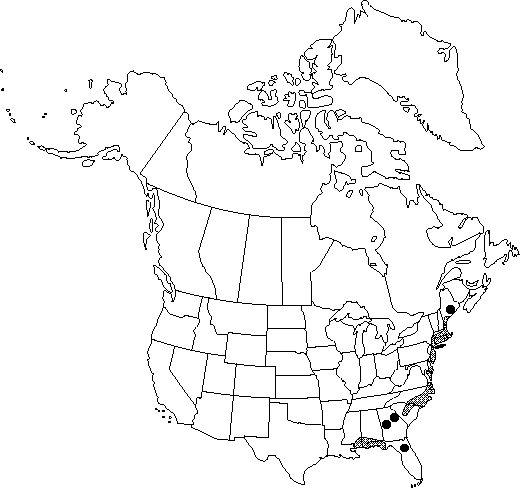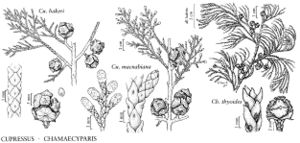Chamaecyparis thyoides
Prelim. Cat. 71. 1888.
Trees to 20 (–28) m; trunk to 0.8 (–1.5) m diam. Bark dark brownish red, less than 3 cm thick, irregularly furrowed and ridged. Branchlet sprays fan-shaped. Leaves of branchlets to 2 mm, apex acute to acuminate, bases of facial leaves often overlapped by apices of subtending facial leaves; glands usually present, circular. Pollen cones 2–4 mm, dark-brown; pollen-sacs yellow. Seed-cones maturing and opening the first-year, 4–9 mm broad, glaucous, bluish purple to reddish-brown, not notably resinous; scales 5–7. Seeds 1–2 per scale, 2–3 mm, wing narrower than body.
Habitat: Bogs and swamps of the Atlantic and Gulf coasts (primarily Coastal Plain)
Elevation: 0–500 m
Distribution

Ala., Conn., Del., Fla., Ga., Maine, Md., Mass., Miss., N.H., N.J., N.Y., N.C., Pa., R.I., S.C., Va.
Discussion
Li H. L. (1962) segregated some populations at the extreme southwestern limit of the species in Alabama, Florida, and Mississippi as Chamaecyparis henryae based on smoother bark, less flattened branchlets, lighter yellowish green foliage, steeper angle of leaf appression to the stem, more prominently keeled but less glandular leaves, and slightly larger cones, seeds, and seed wings. These features were contrasted with phenotypes found in the "northern and mid-Atlantic" populations, and Li proposed a relationship to C. nootkatensis rather than to C. thyoides. Preliminary comparison of herbarium material from the Southeast (including populations in Georgia and Florida) leads to retention of C. thyoides as a subtly variable complex with the imperfectly differentiated C. henryae at one end of the range.
A. J. Rehder (1949) listed, with bibliographic citations, 30 published varieties and forms best considered as cultivars.
Selected References
None.
